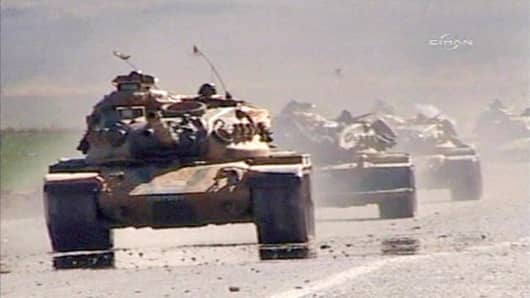Oil rose to near $99 a barrel Friday as an incursion into Iraq by Turkish troops and cold weather in the U.S. Northeast outweighed concerns about mounting problems in the U.S. economy.
U.S. crude settled up 58 cents to $98.81 a barrel after hitting $99.37 earlier in the session, as snow blanketed the U.S. Northeast and boosted heating oil futures. London Brent crude settled up 77 cents to $97.01 a barrel.
"The heating oil market has been supportive," said Eric Wittenauer, analyst at AG Edwards in St. Louis.
Thousands of Turkish troops crossed into northern Iraq in their hunt for Kurdish PKK guerrillas, a senior military source said Friday, escalating a conflict that could destabilize the oil-producing region. (See more on the Turkish offensive below.)
Oil surged to a record high $101.32 Wednesday on expectations OPEC could maintain or reduce output at its March meeting, near the inflation-adjusted high of $102.53 hit in April 1980.
Venezuelan President Hugo Chavez Friday said prices near $100 a barrel were fair and would likely stay near the current level. He added the South American nation would do all it can within OPEC to support prices.
Further strength has come from a rush of speculator money as funds seek a hedge against inflation.
Concerns about the economic health of the United States have helped temper gains in recent weeks, as gasoline demand in the top consuming country has shown signs of weakening under the pressure of the mortgage crisis and the credit crunch.
U.S inventories have swelled, with crude stockpiles up 4.2 million barrels last week while gasoline inventories hit 14-year highs.
While demand from emerging economies such as China and India keep supporting crude prices, analysts have warned of the effects of a potential U.S. recession.
"With oil demand growth risks skewed to the downside in the U.S., we believe there is a growing risk that oil prices are now entering overbought territory," Deutsche Bank analysts said in a research note.
Investment bank Merrill Lynch said the United States was in a recession that could be much worse than the one it faced in 2001, closer to the sharper economic slump of the 1990s.
Oil has averaged $93.02 a barrel this year, up nearly a third on the average in 2007 of $72.30.
Turkey: Fight Will Go On Until Threat Erased
Turkey's military said the cross-border offensive, possibly one of the largest in years, would continue until they had eliminated the threat from PKK rebels, who have been using northern Iraq as a base to stage attacks in neighbouring Turkey.
The United States on Friday urged Turkey, a key regional ally, to limit its offensive to precise targets and to bring the operation to a swift conclusion.
The European Union and the United Nations also urged restraint, fearing the offensive jeopardise the most stable region in Iraq at a time when security is improving.
The Turkish military said its troops had entered Iraq late on Thursday to destroy PKK camps and hunt rebels of the Kurdistan Workers Party (PKK), which has been battling for decades to create a Kurdish homeland in southeast Turkey.
A senior Turkish military source told Reuters troops had clashed with PKK rebels in Iraq. He said many guerrillas had been killed. A PKK spokesman speaking based in northern Iraq said only Turkish soldiers had died.
"The operations inside Iraqi will intensify tomorrow," said the military source, who declined to be named.


